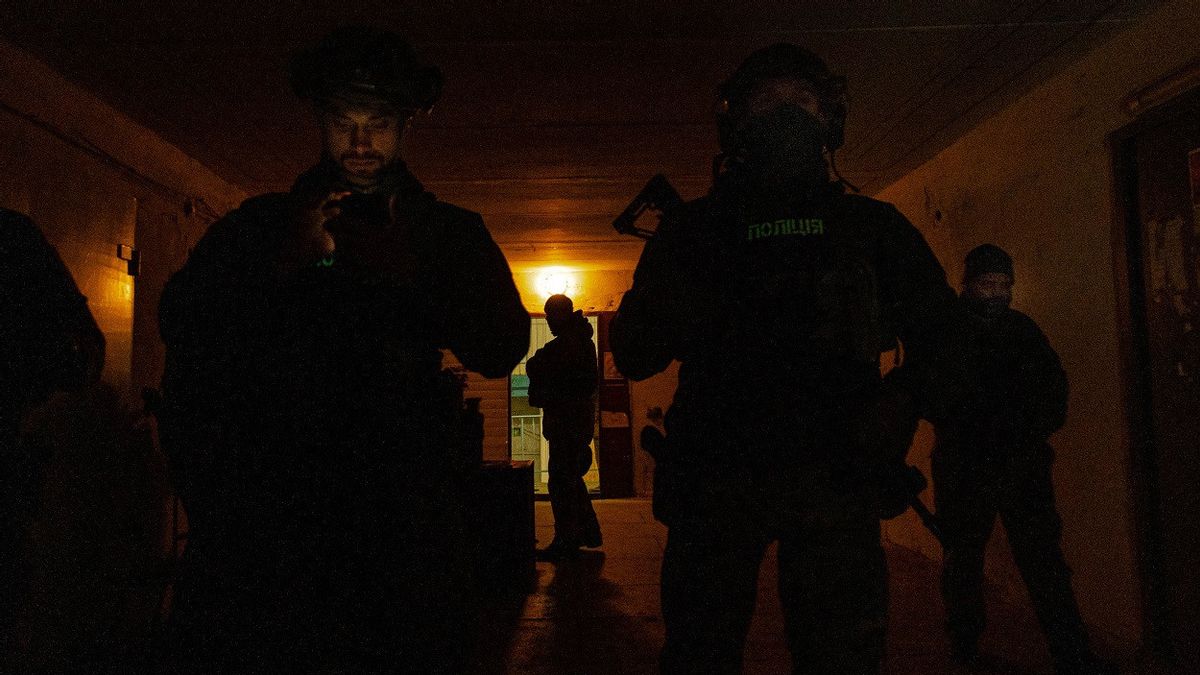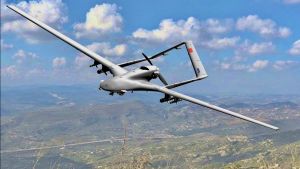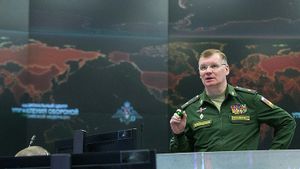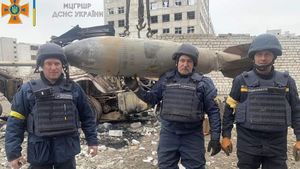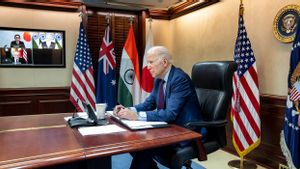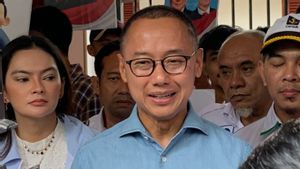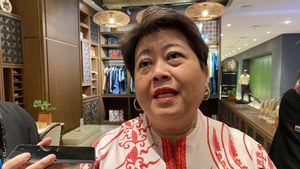JAKARTA - The interest of foreign volunteers to join in helping Ukraine face the Russian invasion has not subsided, although last week Moscow's Defense Ministry said foreign soldiers caught in Ukraine would not be granted prisoner-of-war (POW) status.
Michael Ferkol, who had served as a supplies specialist with a battalion of engineers in the US Army, had been in Rome studying archeology when he heard the Ukrainian president's call for foreign fighters.
In a few days, Ferkol said, he came to the military recruiting office in the western Ukrainian city of Lviv, hoping to be appointed as a front-line paramedic.
"I told them that I wanted to triage patients," said the 29-year-old, who has no combat experience. "There was a Finnish guy there too, and he was like, 'I just want to kill Russians,'" he said.
Ukraine has formed 'international' legions of people from abroad, with President Volodymyr Zelenskiy openly urging foreigners to 'fight side by side with Ukraine against Russian war criminals', to show support for his country.
Last week, President Zelenskiy said more than 16,000 foreigners had volunteered, without specifying how many had arrived.

Several foreign fighters who arrived in Ukraine said they were intrigued by the reason: to stop what they saw as an unprovoked attack, in a once-in-a-generation showdown between democratic forces and dictatorships.
For others, many of whom were veterans of Iraq and Afghanistan, the Ukraine war also offered an opportunity to use fighting skills they felt their own government no longer valued.
Reuters interviewed 20 foreign or other fighters involved in the effort, with some saying Ukraine was struggling to vet, equip and deploy them.
And alongside hard-fought war veterans, those arriving with little or no combat experience, offered limited value in a war zone under constant, terrifying shelling by the Russian military. A man who identified himself as a British military veteran called the recruit a 'bullet catcher'.
Meanwhile, a senior Ukrainian official in Lviv who is involved in processing newly arrived foreign volunteers, Roman Shepelyak said, the system for receiving, training, and deploying foreign fighters is still in its early stages. And that the process will become much smoother in the coming days. Ukraine's defense ministry declined to comment.
Among those who have arrived to fight for Ukraine are dozens of former soldiers from the British Army's elite Parachute Regiment, according to a former soldier from the regiment. Hundreds more would soon follow, he said. Reuters was unable to corroborate those figures.
Often referred to as Paras, the regiment has in recent years served in Afghanistan and Iraq.
"They are all very, very well trained, and have seen active service on many occasions," said the former soldier from the regiment. The Ukrainian crisis will give them purpose, friendship, and a chance to do what they are good at, fighting.
Michael Ferkol says there are many people with Ukrainian ancestry in his hometown of Chicago. He wanted to go to Kyiv, the capital, and help.

"I'm a little nervous, to be honest. But at the same time, it's not about me. It's about people suffering," he said, walking through a crowd of refugees at Lviv's train station on Saturday, hoping to catch a train to the front line.
For some, traveling to Ukraine, even from distant countries, is the easy part. Those without body armor, helmets, and other equipment are struggling to get them in Ukraine, according to several fighters who spoke to Reuters.
Some veterans share information about equipment and logistics via invite-only Facebook or WhatsApp groups, with names like "Have Gun Will Travel." These groups contain applications for equipment, such as body armor and night-vision goggles, or for foreign veterans who are snipers or who can train Ukrainian soldiers on how to use advanced weapons shipped by Western countries.
With the massive mobilization of Ukrainian men going on, the country has a lot of volunteer fighters. However, there is a shortage of specialists who know how to use the Javelin and NLAW anti-tank missiles, which army professionals train for months to use properly.
Even those with combat experience may be fighting in a Ukrainian war zone, warned a former British soldier, who asked to be identified by his nickname, Kruger. He said he had served in Afghanistan and trained other soldiers.
"If you are here as a war tourist, this is not the place for you. The reality of war, if you go to the front line, will be overwhelming," he said.
Many of those who arrived in Lviv ended up in the semi-fortified offices of the Lviv regional administration, where their documents were checked by Shepelyak. He heads the regional department for technical assistance and international cooperation. He acknowledged the system for processing their bids to fight was still in its early stages.
On Friday, when Reuters visited, six foreigners showed up at Shepelyak's office, including a Polish military veteran named Michal, and a giant tattooed Dutchman named Bert. Both men declined to give their full names.
More foreigners are arriving every day, Shepelyak told Reuters. "If they have the desire and persuasion to serve a foreign country, that's important. They're important."
Shepelyak said he checked their documents, not their combat experience, which was evaluated at the military base outside Lviv where they were sent next. He added that those recruited into the Ukrainian army would be paid according to other soldiers.
Other foreign fighters told Reuters they went through a formal process and headed straight for the eastern front, hoping to get weapons and orders from the Ukrainian military upon their arrival.
In central Lviv on Thursday, a burly Canadian, Russian-speaking, who identified himself only as Sig, hoisted an equipment bag into the back of a minivan he bought in Poland and brought to Lviv.
He wore a flak jacket equipped with medical equipment, and said he usually worked as a civilian paramedic.

Another of Sig's four-strong teams is an American who says he was born in the former Soviet republic of Georgia and has fought Russia "for generations."
In Sig's bag were hundreds of kilograms of equipment, including medical supplies and military rations known as MRE, or ready-to-eat meals. Sig said his team plans to help train Ukrainian volunteers in Lviv for a day, before heading straight for the front lines.
"I have connections in Kyiv who will help us," he said.
Separately, standing outside the ticket booth for Lviv station on Sunday was a group of British men in military uniform, waiting for a train to Kyiv. They were very excited, often shaking hands and shaking hands with Ukrainian refugees thanking them for fighting for their country.
They are led by Ben Grant, a burly Englishman from Essex, who says he has served in the British Royal Marines and recently completed a stint as a security adviser in Iraq. He did not specify whether his men would be deployed independently or as part of a Ukrainian unit.
Of the Ukrainian army, Grant added: "They look strong, very strong. I'm more than happy to fight next to them."
However, logistical problems have prompted some fighters to delay their arrival.
Anthony Capone, a wealthy New York City healthcare entrepreneur, said he provided funding for hundreds of ex-soldiers and paramedics who wanted to go to Ukraine. But he said he had postponed their departure "to give the Ukrainian army one more week, to improve their enlistment process for those entering the volunteer corps."
So far, according to Capone, only "a small number" have arrived in neighboring Poland. Capone has posted on LinkedIn his message offering funding. Thinking only 10-15 people will respond, it turns out that according to him there are currently around 1,000 responses that have come.
Capone added he only funds ex-soldiers whose military credentials he can verify, or paramedics currently working in emergency trauma environments.
About 60 percent of those who had contact were Americans and 30 percent European, with the remainder coming from at least 25 countries as far away as Colombia, Japan and Jamaica, Capone said.
Most are former soldiers, the rest are emergency medics or critical care nurses. They are willing to "defend a country they've never been to," said Capone, a specialist in computational learning theory.
SEE ALSO:
For information, last week the Russian Defense Ministry issued a stern warning to foreign soldiers or mercenaries who joined Ukraine, if caught, they will not be recognized as prisoners of war (POW).
"I want to make an official statement that none of the mercenaries sent by the West to Ukraine to fight for the nationalist regime in Kiev, can be considered fighters according to international humanitarian law or enjoy prisoner-of-war (POW) status," a spokesman for the Russian Defense Ministry said. Major General Igor Konashenkov, launched TASS.
He warned that all foreign mercenaries caught and detained in Ukraine would be brought to justice on criminal charges.
"At best, they can be prosecuted as criminals. We urge all foreign nationals who may have plans to go and fight for the Kiyiv nationalist regime, to think a dozen times before proceeding," he said.
The English, Chinese, Japanese, Arabic, and French versions are automatically generated by the AI. So there may still be inaccuracies in translating, please always see Indonesian as our main language. (system supported by DigitalSiber.id)
